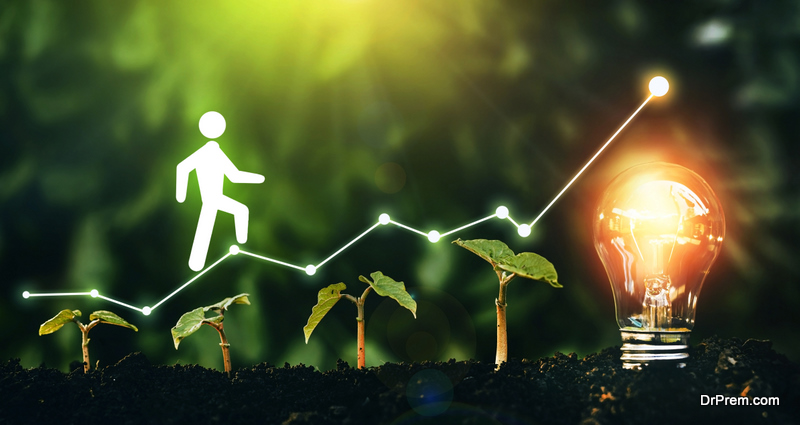
Food waste is an issue which cannot be ignored any longer. Worldwide, a host of cooks, farmers, entrepreneurs and innovators have used the latest technology to reduce the wasting of food.
While bio-degradable straws and similar inventions could provide a viable solution for the plastic in the food waste, food waste needs to be tackled in a different way. It can be reused in different ways, from being used and eaten by the needy and hungry. Or it can be used to make fertilizers and other products.
Take a look at these eco-friendly startups which prove that people out there are concerned about the environment and taking steps to solve its problems.
These eco-friendly startups are combating food waste in unique ways
1. Bluapple
This is a product which has been designed to absorb the ethylene gas produced in refrigerators. This keeps the fresh produce fresh for a longer time. By activating the natural oxidation process, Bluapple increases shelf life by three times. The food waste problem can be solved by using products such as this one, as it will store food till the time it is consumed.
2. Waste-reducing application from OLIO and TakeStock
Another of the eco-friendly startups is OLIO. This start-up has come up with an amazing app which allows individuals and businesses to list their surplus food. Neighbors or people in the vicinity can pick up the food for free or buy it. The app has become quite popular, and the start-up is now announcing new job creations in the company to help it expand.
TakeStock is aiming at SMEs in food industry, wherein suppliers can sell and buy surplus stock. In August 2017, the company was lauded for helping to redistribute 25,000 fish meals to 4,000 people in Manchester.
Green initiatives like this app are leading towards the solution to decrease food waste. Food waste dumped in landfills emanates greenhouse gases like methane, contributing to the global warming problem. When food is used up, it can solve the dual problem of hunger and atmospheric pollution.
3. BluWrap
By the use of fuel cells to reduce and monitor the oxygen inside shipping containers, BluWrap extends shelf life of meat and fish. The in-built sensors create a stable atmosphere throughout the product’s shipping, allowing the food to reach markets in a fresh condition. The food waste problem can be vastly decreased if food does not rot on the way to its destination.
4. BT9 XSENSE
This start-up is actually a cold chain management system, which monitors the state of perishable foods in transit, from producer to the shore shelf. The data from the system can be used to maximize product quality.
5. Copia
Copia is one of those wonderful eco-friendly startups, which connects business, which face the problem of surplus food to non-profits, local shelters, after-school programs and so on. The businesses have to pay a fee calculated on volume and can request for real-time pick-ups to send their surplus food to the people who need it. Copia’s analytics can help to manage and track the surplus food and thus reduce waste.
6. Argent Energy, Brocklesby, Biofuel Evolution producing biofuels
Recycling food is another way to handle the food waste situation. These three eco-friendly startups recycle food to produce biofuels. This reduces the dependence on fossil fuels and reduces emissions too. Biofuel has to be one of the solutions for the future, and if it is extracted from waste food, nothing like that!
7. Edipeel
A lot of food is wasted in storehouses after being harvested, due to natural decay over time. To prevent this, the company Apeel Sciences came out with the Edipeel product which is edible, invisible and tasteless. The product is manufactured from plant extracts (natural extracts), which have been recycled from agricultural waste/byproducts. Edipeel behaves as a barrier from transpiration, microbial activity and oxidation, keeping the harvested produce fresh for a longer time.
8. Entomics and Entocycle – breeding bugs from waste
One of the innovative green initiatives, these two eco-friendly startups use the wasted food as food for insects, which then become food for animals. The amount of waste food, thus used for animal feed is converted into the delectable bugs (black soldier flies)just within a week. Both the start-ups have received the funding they need, and Entocycle is now exploring ways to develop a non-GMO technique to breed the flies faster and better.
9. Freight farms
This company created the ‘Leafy Green Machine’ and the supporting app called Farmhand Connect. The machine works to collectively consistent harvest for every day of the year in different locations. It has a closed-loop hydroponic system inside shipping container outfitted with the climate control technology, and growing equipment. The app allows the farmers to track their climatic conditions and control the temperature, humidity, nutrient levels, pH levels and carbon dioxide.
10.CSS
Another company which is turning food waste into amazing, natural fertilizer is the California Safe Soil, a startup which was founded in 2012. The company converts waste originating in supermarkets to liquid fertilizer. It also makes feed pellets for pigs and chickens. CSS claims its fertilizer can increase the yields of organic produce by 10-40% and using 25% less water.
11.Gebni
Gebni is a great app for foodies and those to hate food going to waste. What it does is, it adjusts the prices of food according to the real-time demand. This makes the food more affordable and increases sales. This works out well for people looking for food at low cost, and increases the accessibility of the food delivery service to customers who have a low income.
12.Winnow
With the Winnow system, the hospitality industry can reduce food waste as it helps them monitor the waste, and tracking how food is being wasted. This helps to identify the areas which need to be kept an eye on, benchmark sites and track the improvement over time.
13.Wakati
This is a standalone device which is powered by solar energy. The device uses hydration to store food, instead of a traditional cooling system. It is a low energy, low cost system, which uses just one liter of water every week. It helps farmers bring crops to the market before they got bad.
Apps like ‘Too Good to Go’ have set world records in their effort to save food from being wasted. Millions of meals have been saved with this app, which is a rage in Europe now. There are two ways to decrease food waste – stopping waste during production and retail, and the second method is to reuse and recycle the cooked food.
Article Submitted By Community Writer
creditSource link






